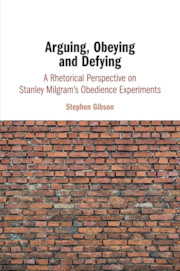Book contents
- Arguing, Obeying and Defying
- Arguing, Obeying and Defying
- Copyright page
- Dedication
- Contents
- Acknowledgements
- Introduction
- 1 The Obedience Experiments
- 2 Re-Evaluating Milgram
- 3 A Rhetorical Perspective
- 4 From Standardised Procedure to Flexible Rhetoric
- 5 From Proximity to Argumentation
- 6 From Passive Agents to Active Rhetoricians
- 7 From a Physical to a Rhetorical Metaphor
- Conclusion
- Appendix Transcription Conventions
- References
- Index
6 - From Passive Agents to Active Rhetoricians
Published online by Cambridge University Press: 15 February 2019
- Arguing, Obeying and Defying
- Arguing, Obeying and Defying
- Copyright page
- Dedication
- Contents
- Acknowledgements
- Introduction
- 1 The Obedience Experiments
- 2 Re-Evaluating Milgram
- 3 A Rhetorical Perspective
- 4 From Standardised Procedure to Flexible Rhetoric
- 5 From Proximity to Argumentation
- 6 From Passive Agents to Active Rhetoricians
- 7 From a Physical to a Rhetorical Metaphor
- Conclusion
- Appendix Transcription Conventions
- References
- Index
Summary
- Type
- Chapter
- Information
- Arguing, Obeying and DefyingA Rhetorical Perspective on Stanley Milgram's Obedience Experiments, pp. 148 - 168Publisher: Cambridge University PressPrint publication year: 2019



